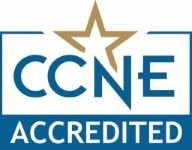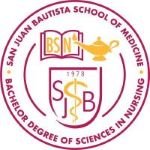View Program Brochure
The baccalaureate degree program in nursing at San Juan Bautista School of Medicine is accredited by the Commission on Collegiate Nursing Education (CCNE). It is a four-year bilingual program that provides students with the opportunity to develop areas such as interpersonal collaboration, decision making, critical thinking, research and leadership. All applicants for the Bachelor Degree of Science in Nursing of the San Juan Bautista School of Medicine must meet the following admission criteria:


Mission: To prepare highly qualified nursing professionals' leaders in community service, education, research, critical thinking, and decision-making to work in collaboration within a changing and culturally diverse society.
Vision: SJBSM Nursing Program Vision is to be nationally recognized as a program that excel in the formation of excellent professional nursing capable to transform the health care service, research and public policy.
- Respect for human dignity
- Honesty
- Authenticity
- Responsibility
- Justice
- Integrity
- Commitment
- Equality
- Loyalty
G1- Provide a baccalaureate nursing education based in the concepts of caring in nursing practice in diverse health care settings across the health-illness continuum applying the ethics, team-based interprofessional collaboration and community services.
G2- Engage in a holistic reflective nursing practice as fomented by arts, sciences, and humanities.
G3- Develop competencies in critical thinking, communication, evidenced–based decision making, scholarly inquiry and nursing skills in clinical practice.
G4- Integrate professional competencies in the nursing roles of provider, designer, manager, and coordinator of care and participate as an active member of the profession.
G5- Assume ethical and legal responsibility and accountability in nursing practice, while applying information technology.
G6- Enhance leadership concepts, skills, and decision-making in creating caring environments to promote health and healing in individuals, families’ communities and global population.
G7- Provide caring environments that facilitate student’s learning to promote health and healing in individuals, families’ communities and global population.
G8- Promote an environment that supports inter-professional education, research, academic freedom, life-long learning, and a culture of quality improvement.
G9- Recruit and retain outstanding, culturally, and linguistically diverse faculty and students.
G10- Prepare nursing students that will be recognized as excellent caring practitioners.
G11- Manage nursing program resources with fiscal responsibility and explore new avenues for funding.
G12- Improve the assessment and evaluation processes to promote program effectiveness.
- Demonstrate commitment to the delivery of ethical and nurturing patient care among well and ill individuals and groups.
- Contribute with competent nursing care according to the health needs of diverse cultural groups and populations in Puerto Rico and other countries.
- Support nursing practice through the application of knowledge that is generated by evidence-based research, the humanities, and natural sciences.
- Provide direct care and demonstrate accountability for their actions.
- Apply skilled oral and written communication and information technology in the delivery of nursing care.
- Make sound decisions and formulate independent clinical judgments.
- Practice effective leadership and contribute as key members of the health care team.
The USA Department of Education requires Program Outcomes 1, 2, and 3.
- At least 70% of the students will complete the program within the stipulated timeframe.
- At least 80% of all test takers will pass the Puerto Rico Board of RN Licensure Nursing Examination.
- At least 80% of the graduates will be employed or pursuing further graduate studies within 12 months of program completion.
- Another outcome of the program
- All employers (100%) who hire our graduates will express at least a 90% satisfaction level according to the results from the Employer’s Satisfaction Survey.
Nursing Practice Concepts
- Clinical Judgment
- Communication
- Compassionate Care
- Diversity, Equity, and Inclusion
- Ethics
- Evidence-Based Practice
- Health Policy
- Social Determinants of Health
The Essentials: Core Competencies for Professional Nursing Education (April 6, 2021) of the American Association of Colleges of Nursing (AACN)
These Essentials address the key stakeholders’ recommendations and landmark documents such as the IOM’s recommendations for the core knowledge required of all healthcare professionals. Download the The Essentials of Baccalaureate Education for Professional Nursing Practice PDF. See competencies and sub-competencies from page 27 to page 54.
Licensing
- Upon completion the program students need to get the Nursing Board Exam of P.R see the links for information.
https://orcps.salud.pr.gov - Be member of PR College of Nursing to work in P.R
https://cpepr.org/
By Law: 2019-01 Bachelor of Science in Nursing Advisory Board.pdf

